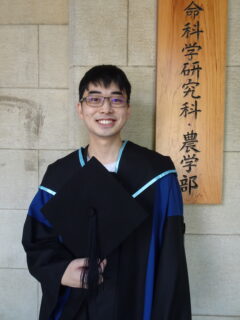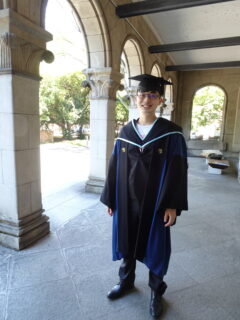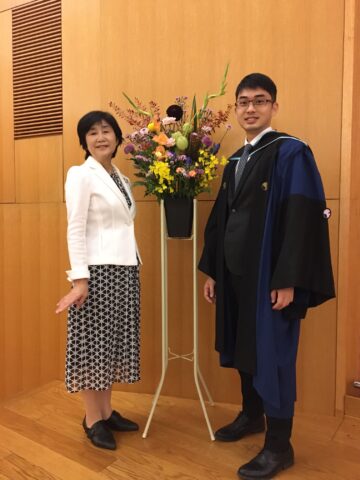Message from a University of Tokyo Fellow, Lo Chieh-Wen
Interviewed by Noriko FUJIMOTO, IPADS Office
LO Chieh-Wen is a 3rd year PhD student in IPADS, and a native of Taiwan. He is under the supervision of Yoko AIDA, Project Professor in Department of Global Agricultural Sciences (Adjunct faculty of IPADS until March 2021), former Chief Researcher in National R & D Institute RIKEN Molecular Virology Research Field, co-supervised by Yasnobu MATSUMOTO, Associate Professor in IPADS.
After earning a master’s degree in the National Taiwan University, Chieh-Wen was admitted to IPADS Doctoral Program in September 2018 and is scheduled to be awarded a doctoral degree this September.
He was chosen as a University of Tokyo Fellow (awardee for the University of Tokyo Special Scholarship for International Students), a prestigious honor given to outstanding new students from abroad, when he entered the program.
He was also chosen to represent all the university’s graduate students to receive his degree at the upcoming autumn graduation ceremony.


Let us know your thoughts on receiving the University of Tokyo Fellowship in IPADS
I’m very happy and grateful with this honor given by IPADS/ Graduate School of Agricultural and Life Sciences. University of Tokyo Fellowship provides substantial financial support for students studying in Japan and therefore I believe the screening is also competitive. I’m very lucky and I’m glad that I have given myself a chance to apply it.
How has this fellowship helped you in your academic life in UTokyo?
The PhD program in IPADS is typically completed in three years, which relatively shorter than other countries. It means that the students here should use the time efficiently for conducting their research. The fellowship provides substantial funding and really frees me up from the financial burden and therefore I can be more focused on my research without needing doing to work part-time or searching for other funding opportunities.
Could you talk about your PhD research? Have you had any difficulty in finishing your doctoral dissertation in three years under the COVID-19 pandemic?
As we know, the outbreak of COVID-19 largely affects our life since the beginning of 2020. The school was closed and working at campus was prohibited for the first few months. I heard that many people’s research was suspended and the progress was delayed due to the pandemic. I was very lucky to have the support from my supervisor Professor Yoko AIDA and her collaborators providing me samples to perform computational analysis while only experiencing minimal effect from the school lock-down. Therefore my progress wasn’t interfered in this period.
The main topic of my research is to understand the relationship between cattle genetic background polymorphism with virus infection outcome. The cattle industry is closely linked with our daily life. In Japan, around 0.3 million ton of beef and 7.4 ton of milk are produced per year. Especially, the beef from Japanese Black cattle (Wagyu) is known for its taste and has high economic value. However, the cattle industry is under severe threat by infectious diseases. Bovine leukemia virus (BLV) infects cattle worldwide. The infection decreases cows’ milk production and around 1-5% of infected animals die from BLV-induced lymphoma. In fact, BLV causes the highest number of deaths of any domestic animals in Japan. However, treatment and vaccines for BLV infection are not yet available. Thus, the alternative strategy is needed to reduce BLV-caused financial burden.
It has been noticed that the severity of BLV-induced symptom is varied in individual cattle, implying that the host genetic background differences in each cattle may influence the disease susceptibility. Under the support by Professor Aida, our lab collected thousands of cattle samples. After analyzing these samples, I found the disease resistance and susceptibility gene isoforms in cattle. The cattle with resistance gene form tends to have lower disease risk; the cattle with susceptibility gene form is more likely to develop disease onset, and thus this gene polymorphism could be applied in cattle breeding selection to reduce BLV-induced onset rate. These results not only help me complete my thesis, but most importantly, could potentially contribute to the cattle industry.
In addition to cattle research, I had the chance to study the novel coronavirus (SARS-CoV-2), the causative agent of COVID-19 in the medical school of Nihon University where the labs were not closed during the pandemic. It was a challenge but also a great experience for me to cope with the emerging infectious disease. I clearly remember that my hands were trembling when I cultured SARS-CoV-2 for the first time even though I have five-year of experience in handling different viruses. Our topic was to develop light-based technologies for environmental SARS-CoV-2 inactivation. The experiment needs to be performed in biosafety level 3’s lab with proper protection wears. Sometimes it takes more than 10 hours for one experiment. I remember Professor Aida always droved us home after we finished experiment. Sometimes the experiment wouldn’t be completed until after 12 am. When looking back at those days, although it was though, it was worth it. The experience makes me feeling that my research is really close to our lives and we are contributing to society.
In the three years PhD program, I advanced by my knowledge and skill to work on my research topics and I’m proud of myself that I did it. I also experienced that the world is changing rapidly, so at times our current knowledge and methods will not be adequate to address all upcoming problems. I think the most valuable thing I learned is that I need to be open-minded and be brave to tackle new issues that I have never faced before.
You are chosen as a representative of the graduating students of the University at the coming autumn graduation ceremony of the University of Tokyo.
I’m so glad to know this and very grateful for having this chance. I especially appreciate Professor Aida and our lab; I couldn’t have this opportunity without their support. The University of Tokyo is my dream school since I was a child. It’s so amazing that I could be the representative of the graduation ceremony. This absolutely will be one of the most memorable moments in my life!
What is your future plan?
Infectious diseases threaten all living organisms. Global warming, climate change and over-exploitation caused by humans influence the habitats of wild animals and therefore increase the chance that we contact with these potential disease carriers. To deal with the unknown emerging infectious diseases that may threaten our life, I would like to keep devoting myself in studying virus prevention and treatment strategies, particularly to the zoonotic viruses that could potentially transmit between different species and even human.

with Dr. Yoko AIDA at the Graduation Ceremony
Related faculty members:
Yasunobu MATSUMOTO, Associate Professor
Note:
From October 2022 intake, it has been decided that the University of Tokyo Fellowship will be awarded to at least one admitted applicant in Round One screening in IPADS each year. For more information >>